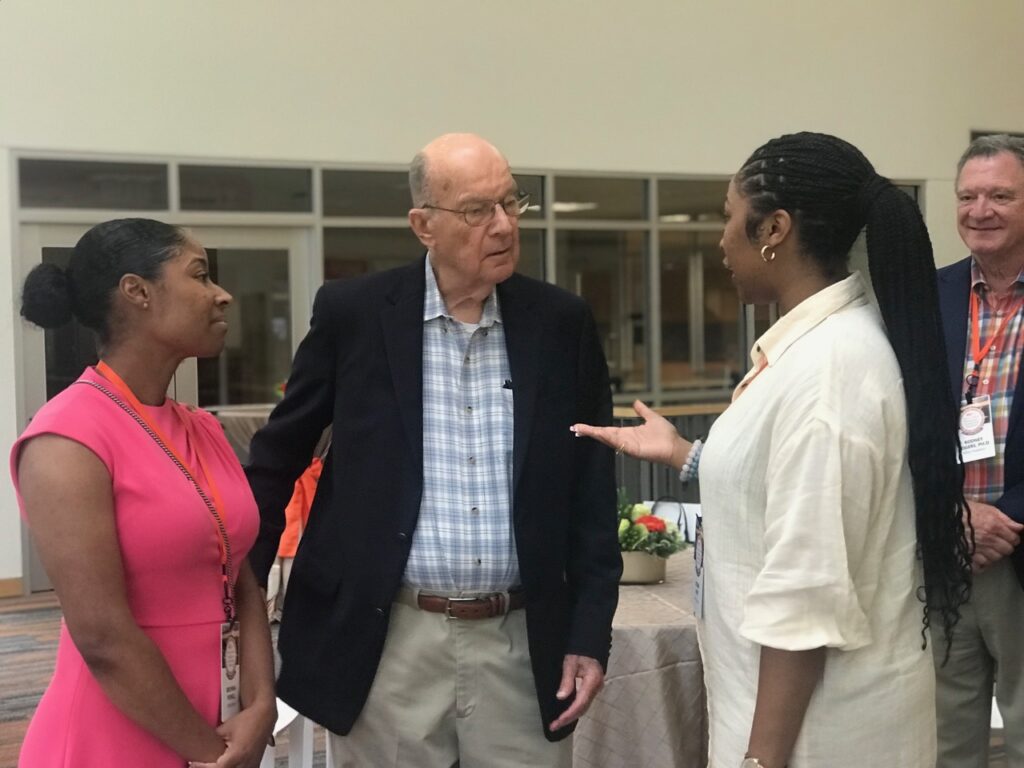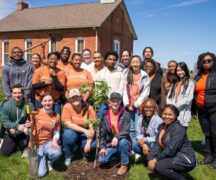By DAVID DUPONT
BG Independent News
University presidents come and go, noted BGSU Presidency Rodney Rogers. And they all launch initiatives.
For Dr. Sidney Ribeau, that was the President’s Leadership Academy.
On Saturday, Ribeau, current students, and alumni gathered on campus to celebrate the 25th anniversary of its founding.
“This initiative is still sticking,” Rogers said. “It’s still going strong.”
Ribeau, who served as BGSU president from 1995 to 2013, said “we used to have this saying that we were going to be the premier learning community in Ohio and one of the best in the nation. P.L.A. became a microcosm of that – a place where students get to know one another, love, trust, and respect one another, and hopefully develop some leadership skills and hone the values that will help them be successful in society.”
The experience of those graduates who had returned for the celebratory symposium showed the value of the academy.
Rogers said: “It’s amazing to me the ways these individuals are having an impact on their communities. It’s the power of education. It’s the power of the P.L.A.”
The academy provides a curriculum in leadership courses, focused on service.
The graduates in attendance spoke about the support that academy provided, and how that helped them to persist in their education, even to return to campus when tough times had them contemplating quitting, and then to launch them into careers after getting their diplomas.

Many are also Thompson Scholars, beneficiaries of a multi-million-dollar scholarship fund started by Bob and Ellen Thompson, an entrepreneur, and a teacher, who met at BGSU.
[RELATED: BGSU dedicates historic quadrangle to Thompsons in recognition of their support for students]
Thompson credited the success of the assembled students and alumni with their education at BGSU. “All are prospering and doing well,” he said. “Without the education they probably wouldn’t be where they are.”
He said he and his wife have donated so much to BGSU and other educational institutions because “education changed my life.”
Thompson, a 1955 graduate, came to the university from Michigan on a football scholarship and worked throughout his days in college. “When I came off the farm wasn’t very confident,” he said “I was dyslexic, so I couldn’t read very well. … I flunked English three times. When I graduated, I knew I was just like everybody else.All I had to do was get up earlier in the morning and work later at night and I could win.”
An education major, he taught briefly before enlisting in the Air Force. When he was discharged, he started a highly successful road construction business, and when he retired and sold the business, he shared a large chunk of the proceeds with his workers, making some of them millionaires.
“We’re blessed with all this money and what can we do to change people’s lives,” Thompson said.
Ribeau praised the Thompson generosity and dedication to supporting the P.L.A. and students. The scholarships, Ribeau said, target the working middle class. The poorest are eligible for a range of scholarships and the wealthy can pay their own way.
The first academy cohort was mostly African-Americans. The diversity soon increased so that now, Ribeau said, “it’s the model of what America looks like.”
In a way, the academy was an early example of diversity and belonging efforts. “It was designed to be an inclusive environment where everyone makes a difference and collectively, we can get things done,” he said.
Now programs in diversity, equity and belonging are under fire from some politicians. And the U.S. Supreme Court recently ruled against affirmative action.
“I think the private institutions are going to be all right. They’ll find a way to have the student body they want because they have the money to do it,” said Ribeau, who left BGSU to be president of the private Howard University, a historically Black institution.
“The state assisted institutions are going to have more of challenge,” he said. “Those state institutions will still try to create a learning environment that represents the values of the institution, and that’s what it’s all about.
“What do want to be like as an institution? Do you want to be a place that stands for inclusion? A place that stands for helping design the kind of American at the collegiate level that’s going to lead to the kind of environment you want for everyone? It’s going to be a challenge,” he said.
“The best schools are going to continue to have the values that reflect the society, but how you do is going to be very difficult because of the Supreme Court ruling,” he continued. “I don’t believe that Bowling Green is going to have any trouble because the admissions process is so holistic.” The university casts a broad net to attract the best students.
Ribeau said that historically Black colleges and universities have been seeing increases in enrollment. Howard is highly selective, accepting 20 percent of its applicants.
“Higher education has been the mainstay of American economic growth and development,” Ribeau said. “That’s how we created the middle class. We’ll find a way to continue serving American society in an effective way no matter what the courts rule because it’s so important.”



